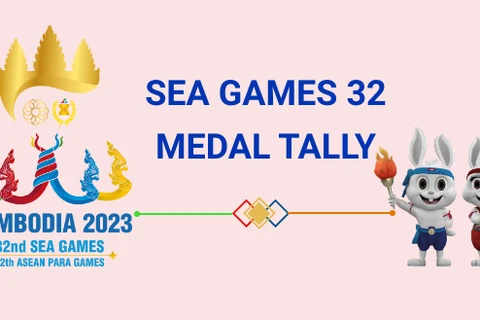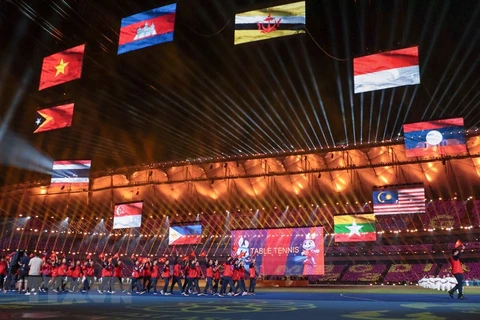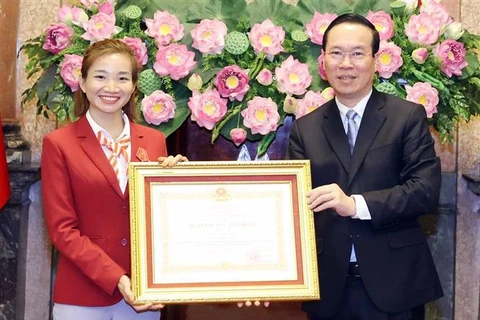 Vietnamese sports need more radical and sustainable steps towards higher goals such as the Asian Games (Asiad) and the Olympic Games. (Photo: VietnamPlus)
Vietnamese sports need more radical and sustainable steps towards higher goals such as the Asian Games (Asiad) and the Olympic Games. (Photo: VietnamPlus) Hanoi (VNA) - For the first time in history, Vietnam topped the SEA Games rankings despite not being its host, which affirms the growth of Vietnam's sports in the region. But in order to get out of the prejudice of the games of the so-called "low-lying areas", Vietnamese sports need more radical and sustainable steps towards higher goals such as the Asian Games (Asiad) and the Olympic Games.
VietnamPlus e-newspaper reporters of the Vietnam News Agency talked to expert Nguyen Hong Minh, former Director of the High Performance Sports Department who served as the head of the Vietnam Sports Delegation many times, and sport journalist Minh Chien, who directly reported on the 32nd SEA Games just held in Cambodia, on the future of Vietnamese sports.
- Reporter: As one of the reporters having the opportunity to report from Cambodia, how does journalist Minh Chien feel about this sports tournament?
- Journalist Minh Chien: The unforgettable impression of reporters working at the 32nd SEA Games comes from the thoughtful and warm welcome of the Organising Committee of host Cambodia. Right upon our arrival, reporters received enthusiastic guidance and help from volunteers. When moving to the venue of the competition, I also noticed that the facilities of the country are very new, the tools and equipment for the competition to the security work were guaranteed.
The most impressive thing is that fans of Cambodia and other countries filled the stadiums to cheer and give strength to their athletes at the 32nd SEA Games.
- Reporter: For the first time, the Vietnamese sports delegation ranked first overall at a sports tournament held abroad, but athletics and swimming lost their No. 1 position in Southeast Asia (in the last two SEA Games) to the Thai delegation. How does expert Nguyen Hong Minh evaluate this result?
- Expert Nguyen Hong Minh: The achievements of the Vietnamese sports deelegation at the 32nd SEA Games once again affirm our position in the regional arena. In the past sports games, the delegation also regularly finished in the Top 3. This shows the stability in the country's sports development roadmap.
In 1989, in Kuala Lumpur (Malaysia), the Vietnamese delegation attended the SEA Games with 40 athletes and won three gold medals. From then until 1997, we often ranked at the bottom of the rankings (seven out of nine or 10 participating countries). Vietnam was still quite far from the "sport powers" at that time, which were Thailand, Indonesia, Malaysia or the Philippines. At the SEA Games in Jakarta (Indonesia) in 1997, Vietnamese sports had a transformation when earning a place in the Top 5 with 30 gold medals. Since then, Vietnamese sports managers have thought that if we host the SEA Games, we must strive to be in the Top 3. The Vietnamese government then approved an athlete training programme for about 6 years towards the SEA Games edition hosted by us.
From the early days, the goal of winning a medal of the Vietnamese sports delegation was just a hope and we always felt we were lagging behind other countries. At the 2003 SEA Games, we ranked first for the first time.
After that, the strategy of Vietnam's sports in the next period (from 2010 to 2020) was determined to always maintain its position in the Top 3. Vietnam has fulfilled the set goal at the next SEA Games editions, including three first and two second places. It can be seen that Vietnam has always maintained stability through the sports tournaments in the region. The fact that Vietnamese sports won the first place at a SEA Games held abroad has affirmed that we have made a strong step forward in the SEA Games arena.
In the development roadmap of Vietnamese sports, we always aim to improve our performance in Olympic sports. In about 30 sports held at the Olympics, the Vietnamese delegation is usually only able to participate in 17 to 20 sports, because some subjects for example horse racing have yet to develope in our country.
Specifically, athletics, swimming, gymnastics, shooting, weightlifting, rowing, archery, basketball, volleyball, table tennis, football, tennis, badminton, and martial arts such as Judo, Taekwondo and Karate are sports that Vietnam has tried to focus on developing.
Previously, in swimming we only had one silver in Kuala Lumpur in 2001 and one gold in the Philippines in 2005, but in Singapore in 2015, the Vietnamese delegation had 10 medals in this sport. For athletics, after 2015, the Vietnamese delegation surpassed Thailand to take the lead in the next three SEA Games.
For gymnastics, a gold medal in 1997 in Jakarta by Nguyen Thi Nga was considered a "success beyond expectations". But then we could also win 11 out of 14 golds of a tournament, and now with only the men's team, we still won four golds.
That is Vietnam’s progress in Olympic sports. In the last SEA Games, we encountered disadvantages. The host country’s removal of most of the Olympics sports such as shooting, archery and rowing from the list of sports caused some countries, including Vietnam, not to "unleash" their full potential at the tournament. Therefore, the achievements of the Vietnamese delegation at the 32nd SEA Games are even more admirable.
We need to affirm that the Olympics is a fiercely competitive arena, and especially Thai people have great respect for sports at the Olympics. I emphasise that the Thai strategy of arranging sports for the Olympics is very clear. This is in contrast to sports managers of other countries. For example, Malaysia's interest in basketball, they only focus on this sport, or like Indonesia, it only focuses on badminton and weightlifting.
But the Thai people are different, as they have a specific calculation and strategy. When they want to "win gold" at the Olympics in taekwondo, they strived by many paths since the 90s of the last century and finally won an Olympics gold in this sport.
In the Olympics race, Vietnam has made progress in many sports, including those where we are at the "Asian level" such as rowing or fencing. Statistics at the 32nd SEA Games, about 75% of sports are in the Olympics programme. The number of medals won by the Vietnamese sports delegation in these events accounted for about 52% of the total number of medals, of which the number of medals in the events put into competition at the Games for the first time by host Cambodia made up about 23%.
However, when consulting with other countries, Thailand did not agree to include the typical sports in the competition programme (Thailand also objected to the inclusion of Vovinam in the competition programmme).
In sports that are not included in the Olympics programme but have traditions in Asia such as wushu, pencak silat and sepak takraw, we still maintain stability.
In my opinion, for athletics and swimming, we don't need to maintain the first place in the region, but we need to strive to be first in sports of the Olympics programme, because those are the events that athletes will compete at the Asiad and the Olympics. The remaining subjects, even with high achievements, are only for competition in the region, so we should not disperse resources.
- Reporter: How does journalist Minh Chien evaluate the point of time for the best performance of athletes, especially in athletics, swimming, and gymnastics, when Asiad (September) is nearing?
- Journalist Minh Chien: Through the process of actual monitoring of athletes competing at the 32nd SEA Games and after a meeting with the media, the head of the Vietnamese sports delegation Dang Ha Viet said that the coaching staff of each sport have their own professional preparation, from which they will choose the point of time for the best performance of athletes at Asiad. As for the competition achievements, we need to recognise that the results are also influenced by a number of factors such as weather and humans.
For example, for the athletics team, we are one of the few teams that do not use naturalised athletes. At this tournament, we joked that Vietnamese athletics were hit by a “silver rain” (12 golds and 20 silvers).
However, if you look at the reality, in some events, athletes can convert from silver to gold, but due to many factors, they cannot succeed. Therefore, I believe that the coaching staff and support providers of the Vietnamese sports delegation have made specific calculations towards the upcoming Asiad.
- Reporter: How does expert Nguyen Hong Minh evaluate the case of athletes who achieved near-Olympics achievements at this SEA Games?
Expert Nguyen Hong Minh: In general, in the region, Thailand is still at the top, and at each Asiad, they usually have from seven to 14 golds, and from two to four golds at each Olympics. Other countries like Indonesia, the Philippines or Singapore all have medals at the Olympics. However, in the past 30 years, the performance of Southeast Asia at continental and world sports tournaments has always been at the bottom. This situation reflects the slow development of regional sports.
In my opinion, the lack of standardisation of sports has hindered their development in the region. In addition, inconsistent schedule also makes it difficult to calculate the point of time for the best performance of athletes. These are also the factors that make the position of the delegations on the medal tally do not reflect the sports potential of the countries.
Therefore, what we need to pay attention to is where the performance of athletes ranks compared to the achievements at the continental and world levels. And sadly, at the 32nd SEA Games, almost no Vietnamese athletes came close to continental achievements. Therefore, competing for a medal in the upcoming Asiad is a huge challenge.
 Managers should not depend on achievements in the SEA Games arena, but should focus on finding talented young athletes, and training them to compete at continental and world tournaments. (Photo: Vietnamplus)
Managers should not depend on achievements in the SEA Games arena, but should focus on finding talented young athletes, and training them to compete at continental and world tournaments. (Photo: Vietnamplus) I think that managers should not depend on achievements in the SEA Games arena, but should focus on finding talented young athletes, and training them to compete at continental and world tournaments.
In my opinion, athletics, gymnastics, weightlifting, shooting, archery, rowing, taekwondo and karate are the sports where Vietnamese athletes have the opportunity to compete for medals at the upcoming Asiad.
- Reporter: Regarding the regime for athletes with high achievements at the Games, is the current policy reasonable to serve a long-term sports development strategy?
- Journalist Minh Chien: The athletes who make contributions to the Vietnamese sports delegation are individuals belonging to their respective establishments and units, each of whom has a working contract (or enjoys different regimes). Therefore, when each player represents the country to compete, he/she is also entitled to the regimes in accordance with regulations of the State.
- Expert Nguyen Hong Minh: Our country’s sports are under the subsidy system. This is different from other countries with developed sports in the region, which saw the involvement of sectors of society. In this regard, our Party and Government have also advocated the involvement of society in sports for a long time, but this process has taken place very slowly and Vietnamese sports are still dependent on the Government, central and local budgets. Over the past years, I have found that most places do not meet the development of sports locally as well as at the national level, although that process has received great attention from the Government.
Currently within the SEA Games framework, record-breaking athletes will be rewarded with 20 million VND (839.4 USD); 45 million VND for winning a gold medal, 25 million VND for a silver, and 20 million VND for a bronze. It must be recognised that, in recent years, the remuneration for national players has been increased many times, but according to the calculations of professionals, that increase is still not guaranteed to motivate athletes to focus on improving their skills.
In recent years, there have been several sports in Vietnam that have received contributions from various resources and competed in world competitions such as golf, e-sports, or mixed martial arts. In my opinion, the sports associations and federations must gather resources from people who love sports, and especially we have a leading organisation - the National Olympics Committee that can partial support for some elite athletes.
Of course, in the period when social organisations in our country have not yet developed, resources from the Government have been "midwives", but it is necessary to attract other resources from society.
Currently, if we don't talk about bonuses (which can come from many sources such as the Government and businesses), resources to serve the process of preparing, training, participating in tournaments are still a shortage, and it is necessary to step up the mobilisation of resources from society. This is an issue that managers, and strategy and policy makers need to focus on to study and solve.
 Vietnamese sports have been at the top of the region, but our mission is to reach the continent and the world arenas. (Photo: VietnamPlus)
Vietnamese sports have been at the top of the region, but our mission is to reach the continent and the world arenas. (Photo: VietnamPlus) Athletes are players who have strived to bring the National Flag flying in the regional and international sports arenas, contributing to glorifying the image of the Vietnamese nation. This is an issue that sports managers need to pay attention to, because it is an honour, a worthy recognition for those who represent the country in major arenas. This is greater significance than the bonus after each tournament.
- Reporter: We would like to thank expert Nguyen Hong Minh and journalist Minh Chien for this conversation!























